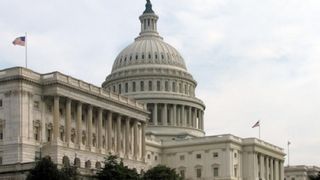Nets Blanket 'Impeachment Day' on Hill

The broadcast and cable networks were blanketing the start of House impeachment debate Wednesday (Dec. 18), with the public provided a window into the scarcity of parliamentary procedures as Republicans launched various efforts to delay the vote.
Related: House Dems Unveil Articles of Impeachment
The House must first vote on the rules of debate--established by the House Rules Committee, then debate the two articles--abuse of power and obstruction of Congress--then hold the debate--six hours, evenly divided--then vote on each article separately--some legislators may split their votes, supporting one article and opposing the other, though at the end of the day the President will almost certainly be impeached, after which the Senate holds a trial on removal from office, which almost certainly will not result in removal given Republican control of that body.
Rep. Diana Degette (D-Colo.) was presiding as Speaker pro tempore for the initial debate, with Speaker Nancy Pelosi (D-Calif.) expected to preside over the vote.
The Republican parliamentary moves began with calling for immediate adjournment then calling for the "yeas and nays" on that motion, followed by a resolution filled with "whereas's" that took several minutes to read as the Republicans offered a laundry list of why the process had been skewed and unfair, ending with a request that the House condemn Rep. Adam Schiff (D-Calif.) chairman of the House Intelligence Committee, for abuse of power, and condemning Rep. Jerrold Nadler (D-N.Y.), chair of the Judiciary Committee, for failing to respond to minority requests for an extra day of hearings. Democrats moved to table the motion, followed by another roll call vote requested by the Republicans.
Among the Schiff offenses, Republicans said, was compelling documents (phone records) from AT&T and Verizon using it to "smear" various people.
House Majority Leader Steny Hoyer (D-Md.) told CNN he did not expect there to be daylong delays by Republicans, but instead those initial moves to signal their opposition to the process, followed by getting on with the sober business of the day.
Broadcasting & Cable Newsletter
The smarter way to stay on top of broadcasting and cable industry. Sign up below
Contributing editor John Eggerton has been an editor and/or writer on media regulation, legislation and policy for over four decades, including covering the FCC, FTC, Congress, the major media trade associations, and the federal courts. In addition to Multichannel News and Broadcasting + Cable, his work has appeared in Radio World, TV Technology, TV Fax, This Week in Consumer Electronics, Variety and the Encyclopedia Britannica.

